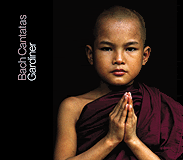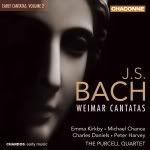It's probably reading a bit much into it to see the negative image of Easter festivities in the sombre music for this day, although it's probably not too far removed given the progress of the biblical narrative which concerns itself with the trials that will face the apostles in their future. The text which Bach had as his starting point was : 'You shall be sorrowful, but your sorrow shall be turned into joy'. As John Eliot Gardiner points out in his sleeve notes, the three surviving cantatas, of which two are outstanding (and one merely excellent!), base themselves upon the journey implicit in this quotation.
 Gardiner's collection, the first disc of Volume 24 of his complete cantata cycle, makes an excellent starting point. He brings together all three of the cantatas for today: BWV 12 'Weinen, Klagen, Sorgen, Zagen'; BWV 103 'Ihr werdet weinen und heulen'; and BWV 146 'Wir mussen durch viel Trübsal in das Reich Gottes eingehen'. Of these, the first is the most recorded and probably the most significant. Beginning with a beautiful, sad instrumental sinfonia, it progresses to a particularly moving chorus, the music dropping down like the tears it describes. It was later re-used by Bach as the 'Crucifixus' of his B Minor Mass. The cantata depicts the journey from sorrow to joy, from pain to healing, in which the alto soloist meditates on the cross, the bass sings of following where Christ is leading and the tenor, with the help of a chorale, Jesu, meine Freude (Gardiner uses a trumpet, others an organ, Herreweghe, below, an oboe) achieves the meaningful reconciliation, underlined by the joyful shot of one of Bach's favourite chorales (or hymn tunes), 'Was Gott tut, das ist wohlgetan', which brings the piece to a close.
Gardiner's collection, the first disc of Volume 24 of his complete cantata cycle, makes an excellent starting point. He brings together all three of the cantatas for today: BWV 12 'Weinen, Klagen, Sorgen, Zagen'; BWV 103 'Ihr werdet weinen und heulen'; and BWV 146 'Wir mussen durch viel Trübsal in das Reich Gottes eingehen'. Of these, the first is the most recorded and probably the most significant. Beginning with a beautiful, sad instrumental sinfonia, it progresses to a particularly moving chorus, the music dropping down like the tears it describes. It was later re-used by Bach as the 'Crucifixus' of his B Minor Mass. The cantata depicts the journey from sorrow to joy, from pain to healing, in which the alto soloist meditates on the cross, the bass sings of following where Christ is leading and the tenor, with the help of a chorale, Jesu, meine Freude (Gardiner uses a trumpet, others an organ, Herreweghe, below, an oboe) achieves the meaningful reconciliation, underlined by the joyful shot of one of Bach's favourite chorales (or hymn tunes), 'Was Gott tut, das ist wohlgetan', which brings the piece to a close. Gardiner's BWV 12 stands its ground well compared to other fine recordings, not least in his painstaking and intense interpretation of the opening chorus. Philippe Herreweghe's is the outstanding version, in my opinion, with outstanding soloists, great sound and a performance by tenor Mark Padmore which is even better than his singing for Gardiner.
Gardiner's BWV 12 stands its ground well compared to other fine recordings, not least in his painstaking and intense interpretation of the opening chorus. Philippe Herreweghe's is the outstanding version, in my opinion, with outstanding soloists, great sound and a performance by tenor Mark Padmore which is even better than his singing for Gardiner. 'Weinen, Klagen...' also features upon the second volume of the Purcell Quartet's series of early Bach cantatas. This excellent CD is available on Chandos Records' download site - www.theclassicalshop.net. In a similar way to the people at Linn Records, Chandos offer their new release CDs in a standard 320kbps MP3 format, or as lossless WMA or WAV files. This is the sort of thing that'll make downloads really competitive with CDs. In addition you can download the cover art and the booklet - the latter can be annoyingly lacking with other download sites. It's an easy way to buy music: the lossless audio version is offered cheaper than the standard CD price, the transaction is conducted by credit or debit card (once you've registered an account) and the files are then made available for individual download or as one zip file. The zip file seems to default to the WMA format, so if you wanted it as WAV files, or as the Apple AIFF format, you'd have to click each track individually.
'Weinen, Klagen...' also features upon the second volume of the Purcell Quartet's series of early Bach cantatas. This excellent CD is available on Chandos Records' download site - www.theclassicalshop.net. In a similar way to the people at Linn Records, Chandos offer their new release CDs in a standard 320kbps MP3 format, or as lossless WMA or WAV files. This is the sort of thing that'll make downloads really competitive with CDs. In addition you can download the cover art and the booklet - the latter can be annoyingly lacking with other download sites. It's an easy way to buy music: the lossless audio version is offered cheaper than the standard CD price, the transaction is conducted by credit or debit card (once you've registered an account) and the files are then made available for individual download or as one zip file. The zip file seems to default to the WMA format, so if you wanted it as WAV files, or as the Apple AIFF format, you'd have to click each track individually.So much for the purchasing. The sound is gorgeous - it's debatable as to whether you can hear the difference on most systems between 320kbps MP3 & lossless audio, but it gives you the opportunity of burning a CD-quality disc of your own to play on your stereo. And is future-proof also. One concern about building a library of lower-quality downloads is that they might sound worse as audio technology moves on. The performance is very good indeed: four of Bach's finest cantatas, sung one voice to a part, the performers' voices are both distinctive and blend together very well. The recording of BWV 12 compares very favourably with Gardiner's brilliant live version and with that of Cantus Colln, performed with the same minimal forces. Charles Daniels is, for me, the pick of the singers: his 'Sei getreu, alle Pein' is beautifully sung with a great balance between his voice and the trumpet chorale. If anything, later on the disc, his 'Mein Verlangen' in 'Komm, du süße Todesstunde' is even better.
I've come to realise that the problem with posts like this is that there is so much to find in a single cantata that including others will either lead to an excessively long entry, or will be so brief as to be not worthwhile. So I'll go for the latter. Suffice to say that BWV 103 is another wonderful piece, of which the opening chorus is the pick, performed with admirable bite and venom by Gardiner. Here he has some serious competition from the recent recording by Masaaki Suzuki (on Volume 36 of his complete series) and the older version by Gustav Leonhardt, both of which also excel in the opening. There's not too much to choose between Leonhardt and Suzuki, and both are slightly more successful than Gardiner to my ears.
BWV 146 is not so well-known or well-recorded, but it is a real gem of a piece. It's a substantial cantata, in which each movement has something special about it. The opening sinfonia is a wonderful tour de force for the organ obligato, given a bravura performance by Silas Standage for Gardiner. The chorus which follows is an oasis of stillness after this big-boned beginning. More wonderfully focused and intense choral singing from the Monteverdi Choir here. These sort of dramatic contrasts in performance are where, for me, Gardiner particularly excels: further contrasts in the arias are also carried off with great aplomb (not to mention the beautiful obligatos). This double CD is one of the best of his series so far and I'd recommend it very much.
No comments:
Post a Comment